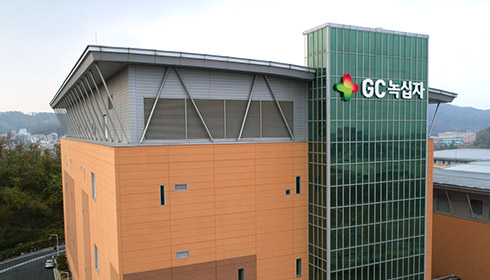GC Biopharma recorded disappointing results last year due to a decline in Covid-19-related demand and the slowing exports of Hunterase amid rising geopolitical risks.
GC Biopharma released its preliminary consolidated operating results for 2023 by disclosing changes in sales or profit and loss structure of 30 percent or more (15 percent for large companies).

According to the disclosure, GC Biopharma posted consolidated sales of 1.62 trillion won ($1.26 billion) and operating profit of 34.4 billion won last year. These represent 4.9 percent and 57.6 percent year-on-year declines, respectively. The company also turned a net loss of 19.8 billion won.
GC Biopharma attributed its sluggish sales to profit declines resulting from internal and external environment changes and the Covid-19 pandemic transitioning into an endemic phase.
Notably, the sales of Hunterase, a high-margin product, plummeted due to the Russian-Ukrainian war, and the company’s vaccine business in the home market was also sluggish.
Hunterase is a treatment for Hunter syndrome, and Russia is the top sales destination among the 13 countries to which Hunterase is exported. In 2022, about 30 percent of Hunterase's overseas sales were generated in Russia. In addition, the demand for flu vaccines has also dropped due to the Covid-19 endemic, adversely affecting GC Biopharma’s sales.
Eugene Investment also analyzed the results due to low growth in the vaccine business and declining sales of Hunterase, an expensive rare disease treatment, which exposed GC Biopharma's unstable profitability.
The brokerage noted that although GC Biopharma's performance is expected to recover thanks to the launch of new products, it is essential to secure stable profitability, adding that the sales trend of Alyglo after its approval from the U.S. FDA will hold the key.
Alyglo is a 10 percent immunoglobulin for intravenous administration used for primary humoral immunodeficiency, also known as congenital immunodeficiency. It won the FDA approval last December.
"We experienced a temporary decline in profitability due to an increase in cost amid higher plasma prices of blood products, increased R&D investments focused on rare disease treatments, and sluggish sales of Hunterase, a high-margin product," a GC Biopharma official said. "We will cover the decline in domestic flu vaccine sales and the sluggish exports of Hunterase due to geopolitical risks by expanding sales of other products including shingles vaccine, Shingrix."
A mid-single digit revenue growth is expected in the second half of the year as new businesses, such as Alyglo's entry into the U.S. market, plant technology exports to Indonesia, and commercial production plans for CMOs ramp up, the official added.
Related articles
- GC Biopharma launches 30-tablet anti-inflammatory drug
- GC Biopharma, Novel Pharma's Sanfilippo Syndrome treatment candidate receives orphan drug status in EU
- Will GC Biopharma release rival shingles vaccine against GSK's Shingrix?
- GC Biopharma’s blood product enters US market for 1st time
- Vaccine manufacturers affected by the endemic struggle to boost declining sales
- Yuhan’s Leclaza, GC Biopharma’s Alyglo win 'grand prize in new drug development'

